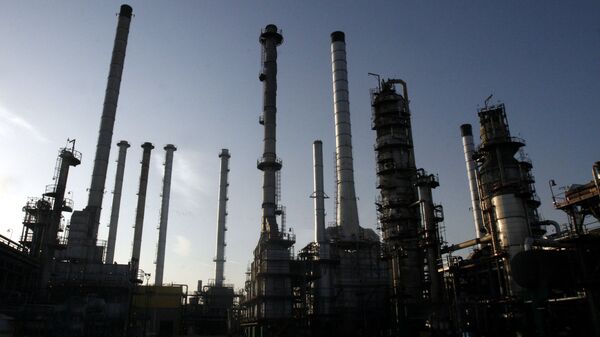The $15 billion credit line to Iran allegedly put forth by French President Emmanuel Macron last month will be paid in three installments, Tasnim News Agency reported, citing Ali Motahari, the second deputy speaker of the Iranian Parliament, as saying.
Under the proposal reportedly worked out during a series of phone conversations between Macron and his Iranian counterpart Hassan Rouhani, a credit line of $15 billion would be established for Iranian oil "pre-purchases" as a condition for Tehran to return to "full compliance" with the Joint Comprehensive Plan of Action (JCPOA), also known as the 2015 nuclear deal.
In exchange for the money, Macron reportedly suggested that Iran refuse to implement the "third step" of its plan to suspend its obligations under the accord, and possibly reverse the two earlier "steps", announced on 8 May and 7 July.
On Friday, The Wall Street Journal cited unnamed sources as claiming that EU diplomats had backed the French initiative to allow Iran to export oil in exchange for Tehran's full complaince with the deal. President Macron reportedly briefed his US counterpart, Donald Trump, on the plan at the recent G7 summit in Biarritz, France, having called on POTUS to ease pressure on Iranian oil exports.
Iran Ditching Nuclear Obligations
Over the weekend, Iranian Foreign Minister Mohammad Javad Zarif informed the French president that Tehran would launch the third stage in scrapping the deal on 6 September if Europe fails to meet its obligations, noting that the step would, however, be reversible.
"In case Europe takes measures to implement [its part of] the Joint Comprehensive Plan of Action, there is a probability of Iran moving away from proceeding to the 3rd round", the top diplomat was quote by the IRNA news agency as saying.
The following day, Iranian Government spokesperson Ali Rabiei said that in the past few weeks, "there have been serious negotiations" between Rouhani and Macron, and "in many areas, our views have come closer together".
In late June, the European Union announced that its financial settlement mechanism, INSTEX, set up to allow trade with Iran despite US sanctions, had become operational. The announcement was made a month after Rouhani warned that Iran would start rolling back some of its voluntary commitments under the nuclear accord if it didn't see some "positive signals" from the remaining signatories to the deal - France, Germany, Russia, China, the UK - in the immediate future.
The warning was issued on the one-year anniversary of the US pullout from the JCPOA, 8 May, with the Iranian president setting out a 60-day deadline for the signatories to ensure its interests are protected or else Tehran would resume enriching uranium at higher levels.
Once the deadline expired, Tehran said that it would start enriching uranium beyond the 3.67 percent level set by the JCPOA and gradually abandon its nuclear obligations every 60 days.
US President Donald Trump pulled Washington out of the Obama-era Joint Comprehensive Plan of Action, signed in 2015 by Iran and the P5+1 nations — Russia, the US, China, France, the UK plus Germany, on 8 May 2018 and reinstated all sanctions against Tehran. The multilateral accord sought to curb Iran's nuclear ambitions in exchange for the gradual lifting of economic sanctions on the country.


